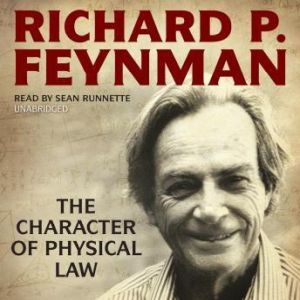

The Character of Physical Law
Author: Richard P. Feynman
Narrator: Sean Runnette
Unabridged: 5 hr 57 min
Format: Digital Audiobook Download
Publisher: Blackstone Audio, Inc.
Published: 06/15/2013
Categories: Nonfiction, Science, Physics


Author: Richard P. Feynman
Narrator: Sean Runnette
Unabridged: 5 hr 57 min
Format: Digital Audiobook Download
Publisher: Blackstone Audio, Inc.
Published: 06/15/2013
Categories: Nonfiction, Science, Physics
Richard P. Feynman (1918–1988) earned a BS from MIT and a PhD from Princeton. From 1942 to 1945, he assisted with the development of the atomic bomb. He then taught at Cornell and Caltech, where he contributed to the theories of superfluidity and quarks. He shared the 1965 Nobel Prize in Physics for work on the theory of quantum electrodynamics.
As I progressed through this excellent little book, I began to feel that the style was somehow familiar from another genre. Mozart? Perhaps e.e. cummings? But my subconscious, while granting that I wasn't totally off-base, informed me that it had a chess analogy in mind. I had never thought about it......more
all the great early-20th century physicists came up with this l. ron hubbardish conceit to invent a pornucopia of whackadoo sci-fi theories and sell 'em to the public as hard 'reality'… the solvay conference - where they came up with the first round of bullshit - was a blast! they eliminated absolut......more
It is impossible, by the way, by picking one of anything to pick one that is not atypical in some sense. That is the wonder of the world. I would probably be giving this little book five stars if I wasn't already familiar with much of it from reading Feynman's Six Easy Pieces and Six Not-So-Easy......more